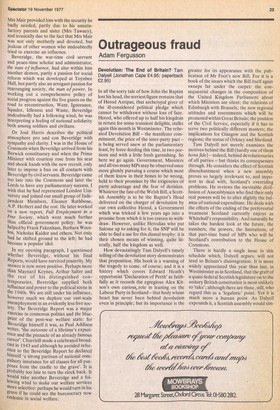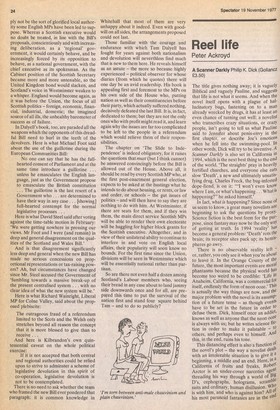Outrageous fraud
Adam Fergusson
Devolution: The End of Britain? Tam Dalyell (Jonathan Cape £4.95; paperback £2.95) In all the sorry tale of how John the Baptist lost his head, the sorriest figure remains that of Herod Antipas, that archetypal giver of the ill-considered political pledge which cannot be withdrawn without loss of face.
Herod, who offered up to half his kingdom in return for some transient delights, stalks again this month in Westminster. The reheated Devolution Bill — the manifesto commitment, the price of the inter-party pact — is being served anew at the parliamentary feast, by force-feeding this time, in two portions and with a little fresh garnishing. So here we go again. Government, Ministers and all too many MPs may be observed once more glumly pursuing a course which most of them know in their bones to be wrong, held to their promises by the exigencies of party advantage and the fear of derision. Whatever the fate of the Welsh Bill, a Scottish Assembly is to be the Baptist's Head delivered on the charger of devolution by our own collective Herod, a Government which was tricked a 'few years ago into a promise from which it is too craven to withdraw. However, unlike Herodias who put Salome up to asking for it, the SNP will be able to find a use for this dismal trophy; it is their chosen means of winning, quite literally, half the kingdom as well.
How devastatingly Tam Dalyell's timely telling of the devolution story demonstrates that proposition. His book is a warning of the tragedy to come, of course; and it is a history which covers Edward Heath's opportunist 'Declaration of Perth' as faithfully as it records the egregious Alex Kitson's own curious, role in leaning on the Labour Party in Scotland — that body whose heart has never been behind devolution even in principle; but its importance is the greater for its appearance with the publication of Mr Foot's new Bill. For it is a book of the issues which the Bill itself again sweeps far under the carpet: the consequential changes in the composition of the United Kingdom Parliament about which Ministers are silent; the relations of Edinburgh with Brussels; the new regional attitudes and resentments which will be promoted within Great Britain; the position of the Civil Service, especially if it has to serve two politically different masters; the implications for Glasgow and the Scottish regions; the status of Orkney and Shetland.
Tam Dalyell not merely examines the motives behind the Bill (hardly one of them bona fide)— indeed, behind devolutionaries of all parties — but thinks its consequences through. He considers the effect of Scottish disenchantment when a new assembly proves so largely irrelevant to, and impotent to deal with, Scotland's overriding problems. He reviews the inevitable disillusion of Assemblymen who find their only real powers will be to alter slightly the balance of national expenditure. He deals with the effects of the ending of the preferential treatment Scotland currently enjoys as Whitehall's responsibility. And naturally he takes the hardest look at the future, the numbers, the powers, the limitations, of that part-time band of MPs who will be Scotland's contribution to the House of Commons.
There is hardly a single issue in this schedule which, Dalyell argues, will not tend to Britain's disintegration. It is more widely appreciated this year than last, in Westminster as in Scotland, that the graft of a quasi-federal Scottish legislature on to the unitary British constitution is most unlikely to 'take'; although there are those, still, who regard this as a 'legalistic' point. Yet it is much more a human point. As Dalyell expounds it, a Scottish assembly would sirn ply not be the sort of glorified local authority some English MPs have been led to suppose. Whereas a Scottish executive would no doubt be treated, in line with the Bill's proposals, conscientiously and with increasing deliberation, as a 'regional' government, it would certainly behave, and be increasingly forced by its opposition to behave, as a national government, with the chief executive as its spokesman. As the Cabinet position of the Scottish Secretary became more and more untenable, so the United Kingdom bond would slacken, and Scotland's voice in Westminster weaken to a whisper. England would become again, as it was before the Union, the focus of all Scottish politics — foreign, economic, financial, industrial, domestic; the imagined source of all ills, the unhealthy barometer of success as of failure.
In Dalyell's book, too, are paraded all the weapons which the opponents of this dreadful Bill need to hurl in the teeth of the devolvers. Here is what Michael Foot said about the use of the guillotine during the European Communities Bill: No one can say that he has the fullhearted consent of Parliament and at the same time introduce a guillotine . unless he emasculates the English language, just as the Government propose to emasculate the British constitution . . . The guillotine is the last resort of a Government who. . . are determined to have their way in any case. . . [showing] full-hearted contempt for the normal legislative processes . .
Here is what David Steel said after voting against the time-table motion in February: 'We were getting nowhere in pressing our views, Mr Foot and I were (and remain) in deep and general disagreement on the qualities of the Scotland and Wales Bill.'
And is that disagreement significantly less deep and general when the new Bill has made no serious concessions on proportional representations or tax-raising powers? Ah, but circumstances have changed since Mr. Steel accused the Government of 'fumbling towards a massive break-up of the present centralised system . . . with no clear idea of what the new system will be.'
Here is what Richard Wainright, Liberal MP for Colne Valley, said about the proposed plebiscite: The outrageous fraud of a referendum limited to the Scots and the Welsh only stretches beyond all reason the concept that it is more blessed to give than to receive . . .
And here is Kilbrandon's own quintessential caveat on the whole political exercise: If it is not accepted that both central and regional authorities could be relied upon to strive to adminster a scheme of legislative devolution in this spirit of co-operation, legislative devolution is not to be contemplated.
There is no need to ask whether the team who framed the new Bill ever pondered that paragraph: it is common knowledge in Whitehall that most of them are very unhappy about it indeed. Even with goodwill on all sides, the arrangements proposed could not last.
Those familiar with the courage and endurance with which Tam Dalyell has fought for years against both nationalism and devolution will neverthless find much that is new to them here. He reveals himself as an astute — the more so because highly experienced — political observer for whose diaries (from which he quotes) there will one day be an avid readership. His book is appealing first and foremost to the MPs on his own side of the House who, putting nation as well as their constituencies before their party, which actually suffered nothing, decisively defeated the last Bill. It is, in fact, dedicated to them; but they are not the only ones who with profit might read it, and learn again why the issues are far too complicated to be left to the people in a referendum which would relieve them of their responsibilities.
The chapter on 'The Slide to Independence' is indeed obligatory, for it raises the questions that must (but I think cannot) be answered convincingly before the Bill is allowed out of the House. Above all, it should be read by every Scottish MP who, at the first post-enactment general election, expects to be asked at the hustings what he intends to do about housing, or rents, or law and order, or schools — the gut issues of politics — and will then have to say they are nothing to do with him. At Westminster, if there are seats for them, and if they win them, the main direct service Scottish MPs will be able to render their own electorate will be haggling for higher block grants for the Scottish executive. Altogether, and in view of their unilateral ability to continue to interfere in and vote on English local affairs, their popularity will soon know no bounds. For the first time since the Union, divisions will be seen in Westminster which will be essentially national rather than partisan.
So are there not even half a dozen among Scotland's Labour members who, seeing their bread in any case about to land jammy side downwards once and for all, are prepared this time to put the survival of the nation first and stand four square behind Tam — and to do so publicly?



































 Previous page
Previous page